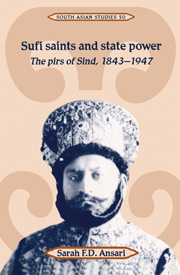Book contents
- Frontmatter
- Contents
- List of illustrations
- Acknowledgements
- A note on spelling
- List of abbreviations
- Glossary
- Introduction
- 1 Sind and its pirs up to 1843
- 2 Creating a system of political control after 1843
- 3 Challenge to the system: the Pir Pagaro and the Hur rebellion of the 1890s
- 4 Challenge to the system: the Khilafat movement, 1919–1924
- 5 A more complex system of political control: pirs and politics under the raj, 1900–1947
- 6 The final challenge: the Pir Pagaro again
- Epilogue
- Conclusion
- Select bibliography
- Index
- Cambridge South Asian Studies
3 - Challenge to the system: the Pir Pagaro and the Hur rebellion of the 1890s
Published online by Cambridge University Press: 01 October 2009
- Frontmatter
- Contents
- List of illustrations
- Acknowledgements
- A note on spelling
- List of abbreviations
- Glossary
- Introduction
- 1 Sind and its pirs up to 1843
- 2 Creating a system of political control after 1843
- 3 Challenge to the system: the Pir Pagaro and the Hur rebellion of the 1890s
- 4 Challenge to the system: the Khilafat movement, 1919–1924
- 5 A more complex system of political control: pirs and politics under the raj, 1900–1947
- 6 The final challenge: the Pir Pagaro again
- Epilogue
- Conclusion
- Select bibliography
- Index
- Cambridge South Asian Studies
Summary
We have … seen the singular spectacle of the peace of the country depending on one single individual, not the representative of the government, but a local ‘saint’.
The central importance of local collaborators to the British system of political control in Sind was demonstrated by the events surrounding two crises of British authority involving pirs during the late nineteenth and early twentieth centuries. In both cases, first the Hur ‘rebellion’ of the 1890s and second the Khilafat movement of 1919–23, the system was put severely to the test but on both occasions it proved its worth in the way in which it helped to restore order to the province. Both crises illustrated well the complexities of the relationship which existed on the one hand between a pir and his followers and on the other hand between a pir and the authorities. Pirs in Sind acted as mediators between Government and society but this did not mean that they were necessarily ‘free agents’: their rôle as intermediaries derived from influence over their murids, while the preservation of their social and economic power largely depended in practice on good working relations with the British. Pirs thus were bound by constraints from both above and below. The British expected them to help in the smooth running of the administration, yet they were also responsible for fulfilling their followers' expectations. Most of the time, pirs were able to balance out the two sets of demands. But problems arose when these demands came into conflict and they had to decide which took priority. It was at these times that the British hold on the Sindhi countryside was endangered and the system of political control was itself directly challenged.
- Type
- Chapter
- Information
- Sufi Saints and State PowerThe Pirs of Sind, 1843–1947, pp. 57 - 76Publisher: Cambridge University PressPrint publication year: 1992



